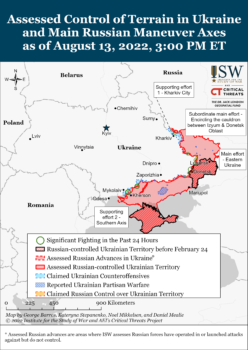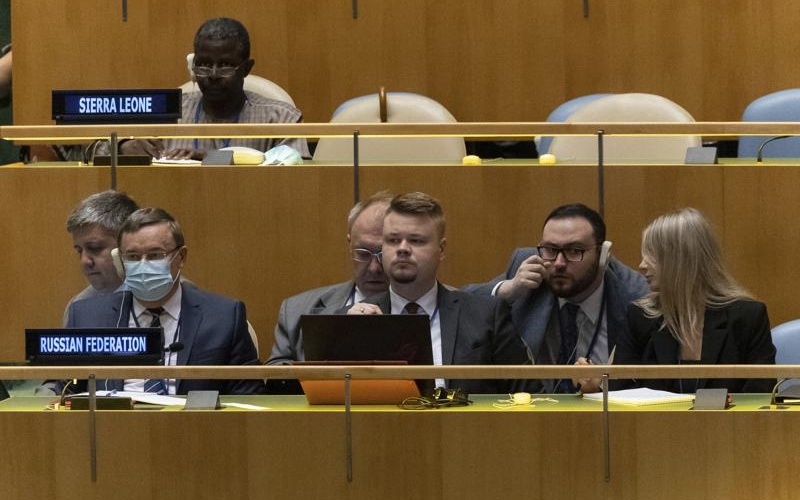Russia’s UN delegation during the 2022 Nuclear Non-Proliferation Treaty review conference, August 1, 2022 (Yuki Iwamura/AP)
Friday’s Coverage: Zelenskiy — “World Narrowly Avoided A Radiation Disaster”

Source: Institute for the Study of War
UPDATE 1314 GMT:
Russia’s forces have again fired on Ukrainian-held territory not far from the Russian-occupied Zaporizhzhia nuclear power plant.
Grad rockets and artillery shells struck the cities of Nikopol and Marhanets, each about 10km (6 miles) and across the Dnieper River from the plant.
UPDATE 1040 GMT:
The US State Department says an American citizen recently died in Ukraine.
Russian proxy officials of the “Donetsk People’s Republic” in eastern Ukraine said the American is Alan Joshua, born in Memphis, Tennessee in 1998.
The officials said Joshua was killed in combat near Yegorovka on August 23.
UPDATE 1029 GMT:
The UK is providing six undersea minehunter drones to help Ukraine clear its coastline of Russian mines.
Three drones will be from UK stocks, and three purchased from industry.
Dozens of Ukrainian navy personnel are being taught to use the drones, with the first group already in training.
UK Defence Secretary Ben Wallace said in a statement:
Russia’s cynical attempts to hold the world’s food supply to ransom must not be allowed to succeed.
This vital equipment and training will help Ukraine make their waters safe, helping to smooth the flow of grain to the rest of the world and supporting the armed forces of Ukraine as they look to defend their coastline and ports.
UPDATE 1010 GMT:
The latest Russian attacks across the Donetsk region in eastern Ukraine have killed two civilians and injured 12.
Governor Pavlo Kyrylenko said both fatalities were in Bakhmut.
UPDATE 0717 GMT:
French energy firm Total is giving up its stake in a Russian gas field that is reportedly providing fuel to Russia’s warplanes.
Total said it signed a deal on Friday with Russian partner Novatek to sell off a 49% holding in the Termokarstovoye gas field “on economic terms enabling TotalEnergies to recover the outstanding amounts invested”.
The firm said Russian authorities approved the divestment on August 25 — the day after revelations in Le Monde claiming that natural gas condensates from Termokarstovoye were being refined into jet fuel for fighter-bombers involved in Moscow’s invasion of Ukraine.
UPDATE 0618 GMT:
With its energy markets limited, Russia is burning off large amounts of liquefied natural gas at a plant near the border with Finland.
Each day the site at Portovaya, north-west of St Petersburg, is flaring 4.34 million cubic metres of gas with a value of about $10 million. Previously the fuel would have been exported to Germany.
Germany’s Ambassador to the UK, Miguel Berger, noted that Russia is burning the gas because Moscow “couldn’t sell it elsewhere”.
The burn-off is raising concerns among scientists about the generation of large volumes of carbon dioxide and soot, exacerbating the melting of Arctic ice.
Portovaya is close to a compressor station at the source of the NordStream 1 pipeline, carrying gas under the sea to Germany. Russia restricted supplies through the pipeline in mid-July, using the pretext of “technical issues”.
However, analysts and people in the area said the burn-off began in June, indicating that the Russians were already unable to sell the gas to other customers.
ORIGINAL ENTRY: Russia has blocked a United Nations agreement to reinforce the nuclear non-proliferation treaty, objecting to a reference to the Russian-occupied Zaporizhzhia nuclear power plant in southern Ukraine.
Four weeks of negotiations, among 151 countries, had crafted the joint statement. But the closing session was delayed for more than four hours as the Russians refused to accept the text, amid growing concern about the risk of their military activities at the Zaporizhzhia complex.
On Thursday the plant, occupied by Moscow’s invasion in early March, was disconnected from the Ukranian electricity grid for the first time in 40 years. The cut in the power supply, caused by fires close to a nearby coal station, put the six reactors at risk.
Power was restored later in the day with a back-up diesel generator, and one of two operating reactors was reconnected to the grid on Friday.
A paragraph in the UN statement referred to “the paramount importance of ensuring control by Ukraine’s competent authorities of nuclear facilities … such as the Zaporizhzia nuclear power plant”.
When the closing session was finally convened, the Russian delegation assailed Ukraine and its “protectors” and said the negotiations were a “one-sided game”. It then walked out of the chamber.
The unilateral move prevented the first statement since 2010 on the non-proliferation treaty, which was established in 1968.
Three weeks ago, the Russian delegation had told the NPT conference:
“The arms control system, which has traditionally been a core pillar of international security and stability, is currently facing a crisis that has no precedent in recent history in terms of its scale….
It is more critical than ever that the nuclear powers behave with restraint and responsibility.

